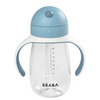There are many reasons why mothers have to give up breastfeeding, which is always upsetting. The most common ones are lack of help, confusing and contradictory information about it and inexperience. Here are some significant testimonials together with the opinion of the experts.
You don't need to feel guilty.
I wasn't able to breastfeed my child because I didn't have any milk, which upset me and made me feel guilty. Why doesn't anyone tell you that mothers shouldn't be blamed if they can't breastfeed, not because they don't want to because they are unable to?
In many cases, when a mother stops breastfeeding her little one, the problem lies with a lack of correct information and competent help, and in some cases low milk supply, also known as lactation insufficiency, insufficient milk syndrome, agalactia, agalactorrhea, hypogalactia or hypogalactorrhea, is the production of breast milk in daily volumes that do not fully meet the nutritional needs of her infant.The worst thing, though, is that the mother often ends up blaming herself and this is mainly due to a lack of acceptance.
In present times mothers try to obtain information from pre-natal classes, the internet, books and social media which often give misleading messages that leave them even more confused.
Neglected mothers.
When I was discharged, they told me that my milk would come in straight away. However, when I got home my son was crying and he kept on crying the next day, so I went back to the hospital and they admitted the baby because he was dehydrated. Why doesn't anyone control and help first-time mothers? Couldn't they be told how to complement breastfeeding during the first few days?
Before being discharged, all mums should obtain the necessary information to understand whether their milk is coming in and whether their child is all right while waiting for this to happen.
In most cases, the milk comes in during the baby's first week of life. However, sometimes it can take longer and can even come in 10 to 12 days later. There are also certain situations that may require more exhaustive checks to be carried out. There are babies who have trouble taking to the breast due to relationship problems or for mechanical reasons, such as difficulty coordinating sucking. Another example is babies with gastro-oesophageal reflux, who suffer from discomfort after feeds. In the face of all these difficulties, it is important to identify and deal with the real problems and then decide on either formula milk or breast milk.











































